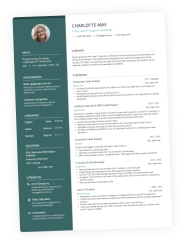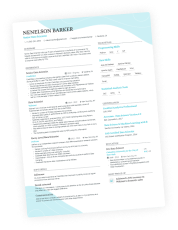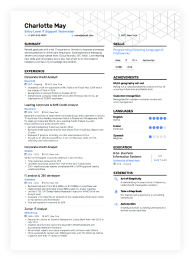Start your morning with task A or B? Answering the customer request or helping out that junior colleague? Caffeine or decaf espresso?
Perhaps your day-to-day includes an array of similar tasks, which challenge and build up your decision-making skills.
And in the past year, you've reached a legendary level around the office in your abilities to make swift and effective choices.
Decision-making skills can most certainly take centre stage of your CV, spotlighting a unique (and coveted) talent by most recruiters.
Your ability to make sound choices can be a winning hand, no matter your role seniority:
- from leaders, who think objectively and strategically about the onset options;
- to entry-level professionals, whose competency creates a platform for productivity and efficiency in their jobs.
But being a soft skill, at times, it may seem quite daunting to quantify your decision-making skills without using clichéd buzzwords, like "outside the box thinker", "effective communicator", or "excellent problem-solver".
Within this guide, we'll show you how to:
- Define decision-making on your CV;
- Why this particular skill set is actually your winning ticket to your next best role;
- Support your decision-making skills with various other soft skills;
- How to talk about your decision-making;
- Best CV sections to spotlight your decision-making talents.
What are decision-making skills?
“It's a choice!”
Decision-making skills signify your ability to select between alternatives, actions, and/or options.
Throughout the process, you consider
- available data and information;
- potential risks and opportunities;
- time and resource constraints;
- overall goals and values of the business or organisation.
You're able to make significant, reliable, and effective decisions, sometimes even in the shortest period of time, for favourable outcomes.
Most often, decision-making skills are linked with:
- information collection and assessment;
- reasoning and considering multiple viewpoints;
- critical thinking and judgement;
- strategic planning and problem-solving.
PRO TIP
What is more, decision-making is a soft skill, so this means you'd have to use your CV to depict the results of the choices you've made.
Most often, you'll have to make decisions upon the following cases or circumstances:
- Programmed vs non-programmed;
- Operational vs strategic;
- Organisational vs personal;
- Individual vs group.
Other types of decision-making include:
- Ethical
- Consumer
- Executive
- Consensus
- Shared
- Rational
- Data-driven
- Intuitive
- Evidence-based
Why is decision-making wanted by recruiters on your CV
It's a well-known fact around the hiring manager community that individuals, who portray strong decision-making skills, are a valuable asset.
Professionals with well-developed skills in making choices can:
- increase overall organisational effectiveness;
- enhance the quality of the team outputs;
- set up strategies for growth;
- ensure higher customer satisfaction and loyalty;
- save time and increase profit margins.
Decision-makers are multi-skilled individuals, who are characterised by:
- effective risk management and resource allocation;
- flexibility to ever-evolving changes;
- leadership in tackling challenges ahead.
There are plenty of soft skills that could hint at your decision-making talents across your CV. Learn what they are in the next section of this guide.
What skills, activities and accomplishments help you highlight your decision-making skills
Decision-making is certainly a multi-faceted skill, embodying multiple talents which your CV could delve into.
Some of the most prominent abilities, that decision-making is usually associated with, include:
- Critical thinking and logical thinking - the ability to understand a complex problem by breaking it down into smaller, more manageable pieces. This skill set allows you to understand potential knowledge gaps while assessing information in an unbiased, logical flow, looking at both the advantages and disadvantages of a certain solution. Illustrate within your CV experience section instances, where you've made decisions based on your ability to analyse evidence, arguments, and assumptions.
- Problem-solving - you're able to identify the root cause and implement effective solutions. Problem-solving encompasses a variety of talents, like your ability to conduct detailed research, identify potential risks, ability to balance different perspectives (and needs), and flexible strategising to pivot. List instances of how you've approached each decision you've had to make as a solution in the CV projects section.
- Time management - in your role, you may often have to think quickly on your feet. How you structure your time matters. List in your CV experience section how you've made effective decisions by prioritising tasks, staying on track with deadlines, and presenting timely progress reports, so everyone is on the same page.
- Insight gathering and evaluating options - if you're popular amongst your team for being the one to quickly gather and assess different perspectives and information, this is one skill you need to spotlight on your CV. Your ability to weigh different alternatives helps create more opportunities for success. By, for example, conducting polls, you're swiftly able to promote collaboration and consensus-building for more efficient choices.
- Strategic planning - you're a big-picture thinker, able to align decisions with the organisational goals and vision. Not only this, but you can lead ahead: step-by-step, foreshadowing issues and adapting choices.
- Creativity - now with decision-making, sometimes the most creative approach may be the best one. You're thus able to harness both your logical and emotional mindset to generate a unique solution. What is the most creative decision you've made in your last job? Make sure to detail the outcomes of your outside-the-box choice.
- Leadership - you're able to achieve success by making decisions to reach shared goals. Not only are you able to motivate and inspire, but also build strong relationships based on trust and mutual understanding. It's evident that it may be more difficult to specify your leadership approach, but if you decide to do so, list on your CV how you've ensured team engagement and productivity across the board for a long-term impact on the organisation.
- Customer-focused - ability to understand the consumer mindset to help them make the best choices. Highlight you’re a customer-focused professional by including any specific product or service knowledge you have and how it has helped you build more positive relationships with clients.
- Team collaboration - consensus-driven choices are at the heart of effective, cross-functional teamwork. This particular skill set focuses on your communication style to gather input, share ideas, and respect different perspectives. Examine on your CV instances, where the best solution were created in a shared environment: what was your role in the collaboration?
- Emotional intelligence - you have an excellent emotional awareness when making a decision. Your way of communicating your innermost thoughts and feelings is motivating, and inspiring a healthier work environment. While emotional intelligence is a soft skill, there are plenty of certifications that can support how you've grown as a person in accepting your emotions.
- Intuition - making a choice can sometimes come down to trusting your instincts, built on experiences and values. Determine instances where your inner guiding light has provided you with opportunities for logical decision-making in your CV summary section.
How to demonstrate decision-making on your CV
- Quantify the end results of the decision you took by defining the decision you made and detailing (briefly) how you made it.
- Think about all the frameworks you use to assess risks and opportunities in your decision-making process.
- Be specific about your decision-making approach - the mastery is in finding the right balance in the details to explain to recruiters the actuality of your skill set.
- Spotlight decision-making skills that are most relevant to the job or company you're applying for, as to stand out, you need an individual approach to the job application process.
- Being a soft skill, it may be more difficult to quantify your decision-making skill, that's why you need to provide concrete examples all across different CV sections.
Example 1: Demonstrate decision-making in the experience section
- •Achieved a 98% success rate in performing +3K complex surgeries, making critical decisions to significantly enhance patient satisfaction to 90%
- •Mentored 15 surgical residents, honing their skills by guiding critical decisions in surgery, resulting in a 20% improvement in complication management
- •Streamlined operating room efficiency, cutting surgical setup time by 20 minutes through strategic decision-making, leading to a £500,000 revenue boost
- •Executed infection control measures, reducing surgical site infections by 40% through informed decisions - enhancing patient safety and compliance
The trick to having an excellent CV experience section is to first assess the job advert requirements and build up your application form there.
Recruiters are very keen on candidates who can detail their experience via the STAR method, where you list:
- Situation
- Task
- Action
- Result
In this case, the candidate has started each bullet with an action verb (e.g. "achieved", "executed"). Another good approach could be to copy a verb or power phrase from the job description and align this with your achievements.
PRO TIP
Always make sure to include a metric to showcase the impact of your decision-making skills.
Example 2: Demonstrate decision-making in the CV summary section
The CV summary is the one that sets the tone for the rest of your application - that's why it's a good idea to make your decision-making skill its focus.
Thus, showcasing to recruiters why your mastery in making choices could be a valuable asset to their organisation.
Notice, in the example above, how the candidate has ensured that their decision-making skills are vastly supported and defined by their leadership and customer-centric talents.
Example 3: Show your decision-making in your achievements sections
The achievements section should once more provide the tangible results of your decision-making skills.
Within it, you could either list:
- supplementary decision-making skills for the very first time or
- accentuate ones you've mentioned before that are important to the role.
PRO TIP
To further capture the job requirement buzzwords, you could name this section "Decision-Making Achievements".
Example 4: Demonstrate the skill through other sections of your CV
Your CV can highlight your decision-making skill set across various other sections, like
- Education - include only your higher education degree. You could potentially opt to mention specific courses or projects that provide recruiters with a snapshot of how you've built your decision-making in an academic setting.
- Projects - make sure to select projects that align with job requirements and at the same time showcase the impact your choices have made. Ensure you've also defined your role within the whole project and the outcomes as metrics.
- Courses - include ones that have built up your ability to make choices, solve problems, and/or lead ahead. Build up your CV courses section with relevant decision-making frameworks and tools.
Decision-making: Key takeaways foryour CV
- Decision-making skills are a type of soft skill that encompasses various skills and talents. Listing it on your CV would hint to recruiters at your leadership and results-driven potential.
- Use various skills and achievements to further build up your decision-making focused CV. The more precise situations you can provide, the easier it would be for employers to understand your decision-making skills.
- Make sure to focus on how you’ve taken decisions in different environments in leadership, customer-focused setting, and within your team. The more those skills align with the job requirements, the more likely your chances are to stand out.
- Dive deep into your decision-making skills in the work experience, summary, and achievements sections of your CV. Make sure to always back up each skill with a tangible metric to define your success.
- Feel free to sprinkle your decision-making talents all across your CV - to provide more personality and proof as to your sill set.



